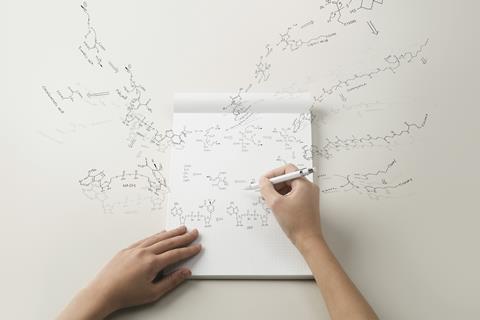We might not be able to tell you how to teach organic chemistry, but we can help you get started
One of my favourite things about my job is seeing how readers respond to the articles we publish. This is something we have an opportunity to delve into every day: we talk to you on Twitter, share articles on Facebook, and pore over statistics from our website, doing our best to understand what you (all) like, what you don’t, and why.
Doing this week in, week out means we develop a keen sense of what chemistry teachers find useful. And there are a couple of topics that always strike a nerve.
One is maths. Any ideas or resources that support teaching calculations in chemistry are always popular. As someone who continually struggled with maths throughout my chemistry education, I can sympathise.

But there’s one topic that readers devour more ferociously than maths, that (perhaps just in my head) chemistry teachers are crying out for help with: organic chemistry.
For example, a few months ago we published Organic chemistry: encouraging problem solving, not goal scoring by Fraser Scott – an article based on research into the approaches students use to tackle organic chemistry mechanism problems. In the sleepy wind down of the last week of term before Christmas, that article attracted four times as many readers than similar articles across the whole previous term.
For example, a few months ago we published Organic chemistry: encouraging problem solving, not goal scoring by Fraser Scott (rsc.li/2XVNiEH) – an article based on research into the approaches students use to tackle organic chemistry mechanism problems. In the sleepy wind down of the last week of term before Christmas, that article attracted four times as many readers than similar articles across the whole previous term.
While I can only sympathise with the struggle of teaching maths, I think I know why teaching organic chemistry is so tricky. In a previous life, I was an organic chemist - a student at first, then researcher, and occasional tutor.
In my undergrad days, I remember struggling with what felt like the monumental degree of rote learning needed to grapple with just the basics of organic chemistry. I wasn’t alone: most of my classmates felt the same way, and panicked comments from students on the internet share this frustration. In a New York Times article from 2013, then student Barbara Moran talked about the struggle of rote learning in organic chemistry as part of a pre-med course at Harvard: ‘… the rules have many, many exceptions, which students find maddening. The same molecule will behave differently in acid or base, in dark or sunlight, in heat or cold, or if you sprinkle magic orgo dust on it and turn around three times.’
In my undergrad days, I remember struggling with what felt like the monumental degree of rote learning needed to grapple with just the basics of organic chemistry. I wasn’t alone: most of my classmates felt the same way, and panicked comments from students on the internet share this frustration. In a New York Times article from 2013 (nyti.ms/2DGUehA), doctor Barbara Moran talked about the struggle of rote learning in organic chemistry as part of a pre-med course at Harvard: ‘… the rules have many, many exceptions, which students find maddening. The same molecule will behave differently in acid or base, in dark or sunlight, in heat or cold, or if you sprinkle magic orgo dust on it and turn around three times.’
Understanding organic chemistry is like knowing another language
After a tough first year of organic chemistry, I realised something that seemed profound at the time: organic chemistry isn’t about rote learning. Of course, this isn’t profound, but it is what makes organic chemistry so difficult to teach. As Barbara puts it: ‘You can’t memorize all the possible answers — you have to rely on intuition, generalising from specific examples. This skill, far more than the details of every reaction, may actually be useful for medicine.’
Teaching the skill of predicting how compounds you’ve never seen before will interact under complex conditions is challenging to say the least. But for me, it was what made organic chemistry, eventually, so fascinating. Understanding organic chemistry is like knowing another language, or a completely new kind of algebra. It’s a tool for solving problems, not a series of facts to learn.
While I think organic chemistry shouldn’t be taught as a rote learning exercise, I’m not able to tell you the right way to teach it. But I can give you somewhere to start. On our website you can find all the articles from EiC that support teaching organic chemistry.
While I think organic chemistry shouldn’t be taught as a rote learning exercise, I’m not able to tell you the right way to teach it. But I can give you somewhere to start. You can find all the articles from EiC that support teaching organic chemistry here: rsc.li/2vqtYTY.














No comments yet